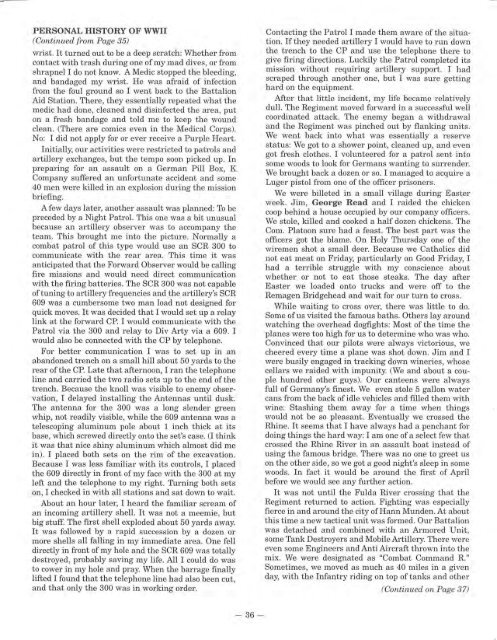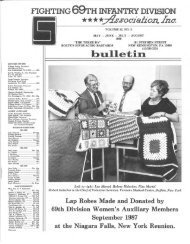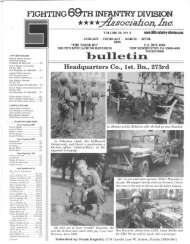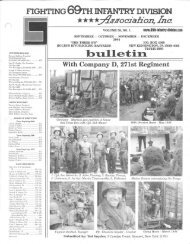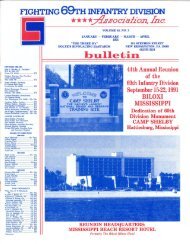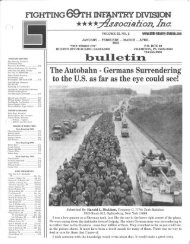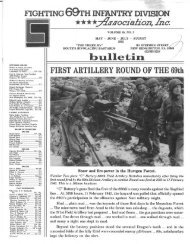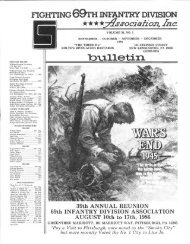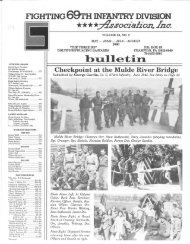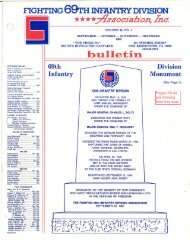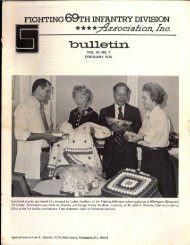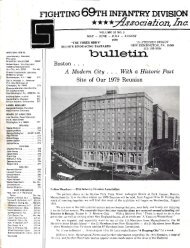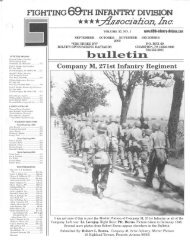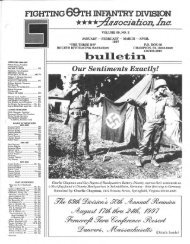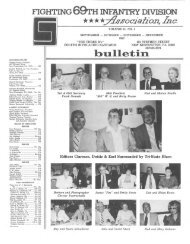The Fighting 69th Infantry Division Association, Inc. Vol. 57 No. 3 ...
The Fighting 69th Infantry Division Association, Inc. Vol. 57 No. 3 ...
The Fighting 69th Infantry Division Association, Inc. Vol. 57 No. 3 ...
You also want an ePaper? Increase the reach of your titles
YUMPU automatically turns print PDFs into web optimized ePapers that Google loves.
PERSONAL HISTORY OF WWII<br />
(Continued from Page 35)<br />
wrist. It turned out to be a deep scratch: Whether from<br />
contact with trash during one of my mad dives, or from<br />
shrapnel I do not know. A Medic stopped the bleeding,<br />
and bandaged my wrist. He was afraid of infection<br />
from the foul ground so I went back to the Battalion<br />
Aid Station. <strong>The</strong>re, they essentially repeated what the<br />
medic had done, cleaned and disinfected the area, put<br />
on a fresh bandage and told me to keep the wound<br />
clean. (<strong>The</strong>re are comics even in the Medical Corps).<br />
<strong>No</strong>: I did not apply for or ever receive a Purple Heart.<br />
Initially, our activities were restricted to patrols and<br />
artillery exchanges, but the tempo soon picked up. In<br />
preparing for an assault on a German Pill Box, K<br />
Company suffered an unfortunate accident and some<br />
40 men were killed in an explosion during the mission<br />
briefing.<br />
A few days later, another assault was planned: To be<br />
preceded by a Night Patrol. This one was a bit unusual<br />
because an artillery observer was to accompany the<br />
team. This brought me into the picture. <strong>No</strong>rmally a<br />
combat patrol of this type would use an SCR 300 to<br />
communicate with the rear area. This time it was<br />
anticipated that the Forward Observer would be calling<br />
fire missions and would need direct communication<br />
with the firing batteries. <strong>The</strong> SCR 300 was not capable<br />
of tuning to artillery frequencies and the artillery's SCR<br />
609 was a cumbersome two man load not designed for<br />
quick moves. It was decided that I would set up a relay<br />
link at the forward CP. I would communicate with the<br />
Patrol via the 300 and relay to Div Arty via a 609. I<br />
would also be connected with the CP by telephone.<br />
For better communication I was to set up in an<br />
abandoned trench on a small hill about 50 yards to the<br />
rear ofthe CP. Late that afternoon, I ran the telephone<br />
line and carried the two radio sets up to the end of the<br />
trench. Because the knoll was visible to enemy observation,<br />
I delayed installing the Antennas until dusk.<br />
<strong>The</strong> antenna for the 300 was a long slender green<br />
whip, not readily visible, while the 609 antenna was a<br />
telescoping aluminum pole about 1 inch thick at its<br />
base, which screwed directly onto the set's case. (I think<br />
it was that nice shiny aluminum which almost did me<br />
in). I placed both sets on the rim of the excavation.<br />
Because I was less familiar with its controls, I placed<br />
the 609 directly in front of my face with the 300 at my<br />
left and the telephone to my right. Turning both sets<br />
on, I checked in with all stations and sat down to wait.<br />
About an hour later, I heard the familiar scream of<br />
an incoming artillery shell. It was not a meemie, but<br />
big stuff. <strong>The</strong> first shell exploded about 50 yards away.<br />
It was followed by a rapid succession by a dozen or<br />
more shells all falling in my immediate area. One fell<br />
directly in front of my hole and the SCR 609 was totally<br />
destroyed, probably saving my life. All I could do was<br />
to cower in my hole and pray. When the barrage finally<br />
lifted I found that the telephone line had also been cut,<br />
and that only the 300 was in working order.<br />
- 36-<br />
Contacting the Patrol I made them aware of the situation.<br />
If they needed artillery I would have to run down<br />
the trench to the CP and use the telephone there to<br />
give firing directions. Luckily the Patrol completed its<br />
mission without requiring artillery support. I had<br />
scraped through another one, but I was sure getting<br />
hard on the equipment.<br />
After that little incident, my life became relatively<br />
dull. <strong>The</strong> Regiment moved forward in a successful well<br />
coordinated attack. <strong>The</strong> enemy began a withdrawal<br />
and the Regiment was pinched out by flanking units.<br />
We went back into what was essentially a reserve<br />
status: We got to a shower point, cleaned up, and even<br />
got fresh clothes. I volunteered for a patrol sent into<br />
some woods to look for Germans wanting to surrender.<br />
We brought back a dozen or so. I managed to acquire a<br />
Luger pistol from one of the officer prisoners.<br />
We were billeted in a small village during Easter<br />
week. Jim, George Read and I raided the chicken<br />
coop behind a house occupied by our company officers.<br />
We stole, killed and cooked a half dozen chickens. <strong>The</strong><br />
Com. Platoon sure had a feast. <strong>The</strong> best part was the<br />
officers got the blame. On Holy Thursday one of the<br />
wiremen shot a small deer. Because we Catholics did<br />
not eat meat on Friday, particularly on Good Friday, I<br />
had a terrible struggle with my conscience about<br />
whether or not to eat those steaks. <strong>The</strong> day after<br />
Easter we loaded onto trucks and were off to the<br />
Remagen Bridgehead and wait for our turn to cross.<br />
While waiting to cross over, there was little to do.<br />
Some of us visited the famous baths. Others lay around<br />
watching the overhead dogfights: Most of the time the<br />
planes were too high for us to determine who was who.<br />
Convinced that our pilots were always victorious, we<br />
cheered every time a plane was shot down. Jim and I<br />
were busily engaged in tracking down wineries, whose<br />
cellars we raided with impunity. (We and about a couple<br />
hundred other guys). Our canteens were always<br />
full of Germany's finest. We even stole 5 gallon water<br />
cans from the back of idle vehicles and filled them with<br />
wine: Stashing them away for a time when things<br />
would not be so pleasant. Eventually we crossed the<br />
Rhine. It seems that I have always had a penchant for<br />
doing things the hard way: I am one of a select few that<br />
crossed the Rhine River in an assault boat instead of<br />
using the famous bridge. <strong>The</strong>re was no one to greet us<br />
on the other side, so we got a good night's sleep in some<br />
woods. In fact it would be around the first of April<br />
before we would see any further action.<br />
It was not until the Fulda River crossing that the<br />
Regiment returned to action. <strong>Fighting</strong> was especially<br />
fierce in and around the city of Hann Munden. At about<br />
this time a new tactical unit was formed. Our Battalion<br />
was detached and combined with an Armored Unit,<br />
some Tank Destroyers and Mobile Artillery. <strong>The</strong>re were<br />
even some Engineers and Anti Aircraft thrown into the<br />
mix. We were designated as "Combat Command R"<br />
Sometimes, we moved as much as 40 miles in a given<br />
day, with the <strong>Infantry</strong> riding on top of tanks and other<br />
(Continued on Page 37)


